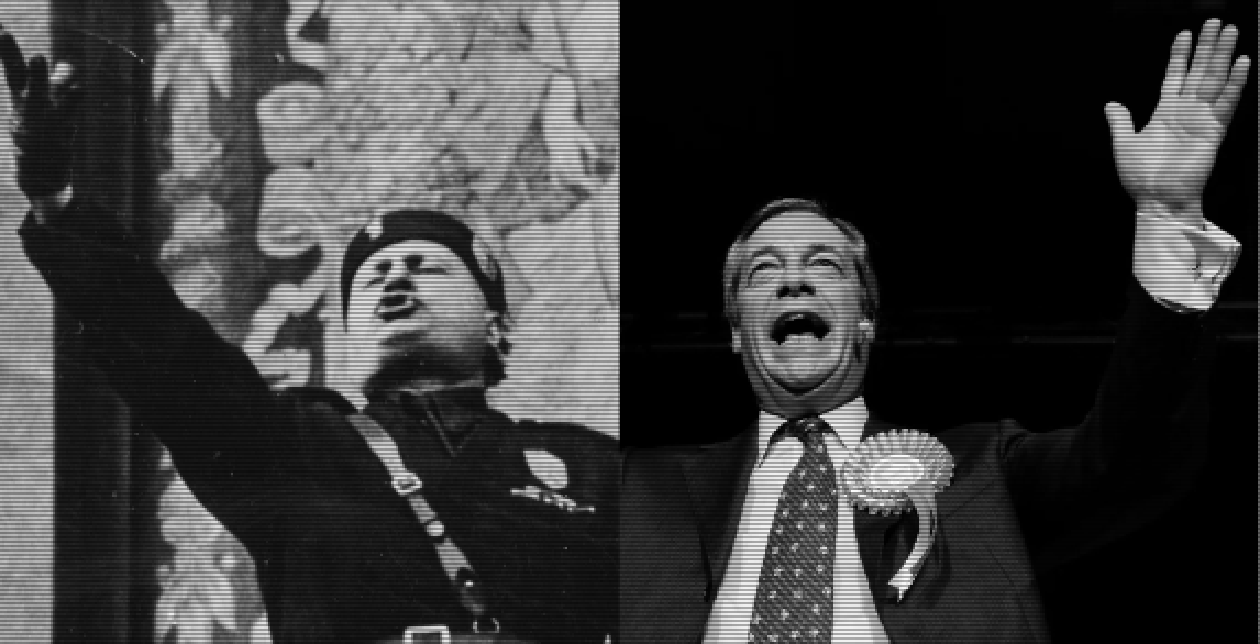Why Are People Calling Reform UK Fascist? Here’s Why
Understanding the Alarming Parallels Between Reform UK’s Rhetoric and the Roots of Fascism
By Sean Ash
In recent months, Reform UK has surged in popularity, but so too have the concerns. Critics have begun using a word that carries serious historical weight: fascist. But what does that mean? And is it fair?
To some, it sounds like a smear, just another overused insult thrown at a right-wing party. But to others, especially those who know their history, the comparison isn’t just rhetorical; it’s cautionary. So let’s break it down.
This article explains the core traits of fascism, how they’ve appeared historically, and why many see alarming parallels in Reform UK’s rhetoric and proposals.
What is Fascism, Really?
Fascism is not simply being “very right-wing” or “a bit authoritarian.” It’s a political ideology with a distinct set of traits, including:
- Ultranationalism: An obsession with the superiority or purity of one’s nation.
- Authoritarianism: Disregard for legal checks and balances.
- Scapegoating: Blaming minorities or outsiders for society’s problems.
- Suppression of dissent: Banning ideas and silencing opposition.
- Militarism / Law-and-order obsession: Control through force, punishment, and fear.
- Anti-intellectualism: Rejecting expert opinion in favour of ideology or emotion.
- Disrespect for human rights: Especially toward minorities.
- Concentration of power: Undermining democratic structures.
- Propaganda: Manipulating the media to control public opinion.
- Rejection of international law: Prioritising national sovereignty above global cooperation.
Historical Fascism: A Snapshot
To see how fascism plays out, look at 1930s Europe:
- Mussolini glorified Italian heritage while jailing dissenters.
- Hitler blamed Jews, Roma, and the disabled for Germany’s decline.
- Both banned opposition parties, attacked unions, and turned law enforcement into tools of fear.
- They used state propaganda to build national myths and justify cruelty.
Fascism often starts with populist promises, but it ends with control, division, and violence.
Where Reform UK Fits In
Reform UK, led by Nigel Farage, insists it is defending British democracy, free speech, and fairness. But beneath that surface, many analysts and citizens are alarmed by the direction of their language and policies. Let’s take a closer look:
|
Fascist Trait |
Reform UK Example |
|
Ultranationalism |
Emphasis on “taking back our country”, reclaiming “British values,” and shutting borders to migrants. |
|
Authoritarianism |
Proposals to override UK courts, pull out of the European Convention on Human Rights, and ignore international treaties. |
|
Scapegoating |
Repeated focus on asylum seekers, migrants, and trans people as threats to society, often with inflammatory language like “invasion”. |
|
Suppression of dissent |
Support for banning certain topics in schools, particularly around gender and sexuality. |
|
Militarism / Law-and-order |
Heavy focus on deportation, police crackdowns, and prison expansion. |
|
Anti-intellectualism |
Dismissal of expert criticism as “woke” or elite, promoting culture war narratives over nuanced debate. |
|
Disregard for minority rights |
Calls to end Equality Act protections, reduce support for disabled and marginalised groups under the guise of fairness. |
|
Concentration of power |
Proposals that would limit judicial review and sideline international legal obligations. |
|
Propaganda tactics |
Use of simple slogans, fear-based messaging, and attacks on journalists or dissenting voices. |
|
Rejection of international law |
Plans to abandon the ECHR, withdraw from UN agreements, and isolate Britain from global legal standards. |
But They’re Not Hitler, Right?
Correct, Reform UK is not calling for a dictatorship, doesn’t have paramilitary groups, and hasn’t abolished elections. That’s why most scholars do not call them a fascist party in the full historical sense.
But that doesn’t mean the comparison is baseless. Instead, many argue that Reform UK is proto-fascist, that is, it exhibits the early warning signs. These signs don’t appear all at once. They grow slowly, normalised by media repetition, public fatigue, and anger.
Fascism isn’t always announced with a marching army. Sometimes it walks in with a smile, a flag, and a promise to protect you from people you’re told to fear.
Why This Matters
We all want security, opportunity, and a sense of belonging. But history shows that when we chase those things by blaming others or by tearing down the institutions designed to protect all people, we don’t end up safer. We end up more divided, more frightened, and ultimately less free.
You don’t need to agree with everything the left says. But if a political party begins using language that resembles fascist movements, scapegoating minorities, rejecting courts, promising unchecked power, then it’s not “just politics.” It’s a warning.
Learn From History, Don’t Repeat It
Calling a party “fascist” isn’t a cheap insult. It’s a reminder: democracy is fragile. It dies not when a tyrant rises, but when enough people decide it’s easier to look the other way.
Reform UK may not wear the same uniform as yesterday’s fascists. But many of the ideas are disturbingly familiar. And that’s precisely why we need to pay attention, before it’s too late.


Comments
Post a Comment